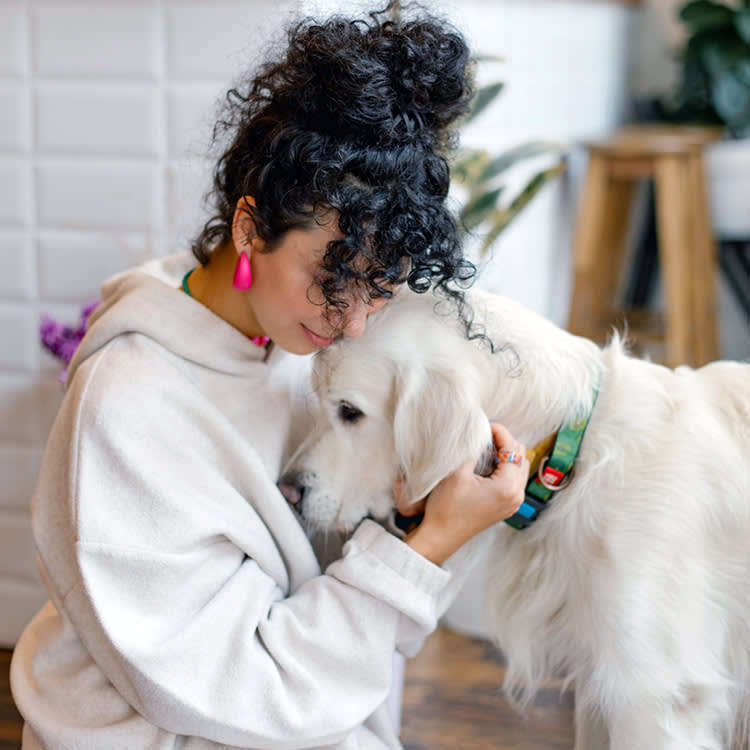What Medication Can You Give Your Dog for Anxiety?
Here are some options your vet can help you consider.

Share Article
In This Article:
How Do I Know If Anxiety Medication Is Right for My Dog?opens in a new tab Types of Anxiety Medication For Dogsopens in a new tab Prescription Anxiety Medication for Dogsopens in a new tab Over-the-Counter Anxiety Medication For Dogs opens in a new tab Natural Remedies for Anxiety in Dogsopens in a new tab
Many pet parents have dogs struggling to cope with anxiety. The good news is that there are medications that can help. But remember, it’s always best to consult with your veterinarian before giving your dog any medication, even over-the-counter ones. Your veterinarian can help you determine the best medication for your dog’s specific needs and ensure that it is safe for them to take.

littleKin™ is Kinship’s home just for puppy and kitten parents. Check it out for expert advice, new pet tools, and a free box of food samples.
opens in a new tabHow do I know if anxiety medication is right for my dog?
No dog parentopens in a new tab wants to see their pup in pain, whether it’s physical or emotional. Emotional and behavioral issues in dogs often manifest in undesirable and destructive conduct, making addressing these problems feel especially pressing. Don’t forget that some abnormal behaviors may stem from medical issues, so it’s important to have a dog undergo a health screening before labeling them as a “problem child” or seeking medicationopens in a new tab. Talk to your veterinarian if your dog’s behavior ever changes suddenly, because it could indicate a medical problem.
Many factors can contribute to a dog’s anxiety, including lack of early socialization, lack of mental/physical stimulation, triggers (like loud noises), and personality. Some dogs continue to struggle with anxietyopens in a new tab, despite their parents' best efforts. Dogs with anxiety can exhibit a variety of behaviors including:
Pacing
Excessive vocalization or whining
Panting
Hiding
Compulsive grooming
Inappropriate urination or defecation
Destructive behavior
Avoidance of certain people or places
Once your vet rules out a medical issue as the cause of your dog’s anxiety, they may prescribe anti-anxiety medications as part of a behavioral treatment plan to help your dog. This may be in conjunction with a referral to a veterinary behaviorist.
What are the types of dog anxiety medication?
Three of the most commonly used types of medication for dog anxiety are selective serotonin reuptake inhibitors (SSRIs), tricyclic antidepressants (TCAs), and benzodiazepines. These medications work by influencing mood-altering neurotransmitters: serotonin, dopamine, and norepinephrine.
Selective serotonin reuptake inhibitors (SSRIs)
Serotonin is a chemical messenger that helps to regulate mood, appetite, and stress response. Selective serotonin reuptake inhibitors (SSRIs) block reabsorption of serotonin, leaving more available in the brain. This drug class is often used for chronic management and can take weeks to show results. Examples of SSRIs used for dog anxiety include fluoxetine (Prozac) and sertraline (Zoloft).
Tricyclic antidepressants (TCAs)
Tricyclic antidepressants (TCAs) block the reabsorption of serotonin, norepinephrine, and acetylcholine. Norepinephrine and acetylcholine influence mood, alertness, and attention. Like SSRIs, tricyclic antidepressants are often used to help manage chronic anxiety. Examples of TCAs used for dog anxiety include amitriptyline (Elavil) and clomipramine (Clomicalm).
Benzodiazepines
Benzodiazepines are a type of drug that slow down activity in the central nervous system, causing sedation and reduced anxiety. These drugs tend to be fast-acting and are commonly used for situational anxiety in dogs, like noise/thunderstorm phobia and stress with travel. Examples of benzodiazepines used for dog anxiety include alprazolam (Xanax), diazepam (Valium), and lorazepam (Ativan).
Prescription anxiety for medication in dogs
Addressing fear and anxiety in a dog can be a long process that involves some experimentation. Non-medication techniques, like increasing exercise and mental stimulation, should be implemented before medications. Ultimately, some dogs can truly benefit from anti-anxiety medications.
There’s no one-size-fits-all solution when it comes to anxiety medications for dogs; it depends on the needs of each individual dog. Some pups only need medication to help them cope with infrequent triggers, like occasional car rides or Fourth of July fireworksopens in a new tab, while other dogs may need long-term medication to deal with daily stress. Responses to medications vary among dogs, and they often need to be on the medication for at least a month to show signs of improvement. Below are some commonly prescribed anxiety medications for dogs.
Trazodone
Brand Name(s): Oleptro, Desyrel
Category: Serotonin modulator (serotonin antagonist and reuptake inhibitor)
Prescription required? Yes
Use: Because Trazodone is fast-acting, it is often used for short-term situations, like car ridesopens in a new tab, thunderstorm phobias, travel, boarding, and post-surgical confinement.
Side Effects: Sedation, ataxia (unsteady gait), increased appetite, vomiting, diarrhea, drooling, loss of inhibition
Alprazolam
Brand Name(s): Xanax
Category: Benzodiazepine
Prescription required? Yes
Use: Alprazolam is often used to treat panic attacks that are triggered by loud noises like fireworks, thunderstorms, and construction. Alprazolam is quick-acting and works best when given right before anxious behavior may start. Many vets recommend giving the drug 30 to 60 minutes before a triggering event is expected.
Side Effects: Sedation, ataxia (unsteady gait), increased appetite
Fluoxetine
Brand name(s): Prozac, Reconcile
Category: SSRI
Prescription required? Yes
Use: Fluoxetine is often used to treat separation anxietyopens in a new tab, noise/storm phobias, aggression, and compulsive behaviors, like over-grooming and self-mutilation. It is normally given daily for several weeks before pet parents and veterinarians determine if the drug is working. Fluoxetine is FDA-approved for separation anxiety in dogs.
Side effects: Lethargy, decreased appetite/anorexia, vomiting, diarrhea, restlessness, increased aggression
Amitriptyline
Brand Name(s): Elavil
Category: TCA
Prescription required? Yes
Use: Amitriptyline is often used for long-term management of separation anxiety and compulsive behaviors, like excessive grooming. Dogs may need to be on the drug for a few weeks before its effects are seen.
Side effects: Sedation, constipation, urine retention (holding urine in)
Sertraline
Brand Name(s): Zoloft
Category: SSRI
Prescription required? Yes
Use: Sertraline is often prescribed for chronic management of generalized anxiety and behaviors like compulsive grooming and fear-based aggression.
Side effects: Decreased appetite/anorexia, vomiting, lethargy, restlessness, increased aggression
Clomipramine
Brand name(s): Clomicalm, Anafranil
Category: TCA
Prescription required? Yes
Use: Clomipramine was the first FDA-approved drug to treat separation anxiety in dogs. The drug is also prescribed off-label to help manage noise/thunderstorm phobias and compulsive behaviors.
Side effects: Sedation, lethargy, vomiting, change in appetite (increase or decrease), constipation, urine retention (holding urine in), and decreased tear production
Dexmedetomidine, oromucosal gel
Brand name(s): Sileo
Category: Alpha-2 agonist
Prescription required? Yes
Use: Dexmedetomidine in oromucosal gel form is the first drug FDA-approved to treat noise aversion in dogs. It is fast-acting and can be given in anticipation of thunderstorms, fireworks, or other loud noises. If possible, the drug should be given 30 to 60 minutes before an anticipated noise trigger.
Side effects: Sedation, vomiting, pale gums soon after administration, lowered heart rate
Paroxetine
Brand name(s): Paxil
Category: SSRI
Prescription required? Yes
Use: Paroxetine is given to dogs for chronic management of generalized anxiety and compulsive behaviors. It can often take a month or so to determine if Paroxetine will have the desired effect for a dog.
Side effects: Lethargy, decreased appetite/anorexia, vomiting, restlessness, increased aggression
Can I give my dog over-the-counter medication for anxiety?
Dog parents may find themselves in a situation where they consider over-the-counter dog anxiety medication options. Maybe they didn’t anticipate their dog’s reaction to a sudden storm. Or their dog who is usually happy to go on short car rides isn’t really enjoying the cross-country road trip. Or maybe they forgot to include their dog in the Fourth of July preparations (plan ahead folks!).
While some dog parents have found success with over-the-counter options, it’s essential to recognize that there are no consistently effective solutions. Consult with your veterinarian before giving your dog any medication, even if the medication is available over the counter.
Benadryl
Benadryl (diphenhydramine) is an antihistamine often used to counter the effects of occasional allergies. Many people experience profound sleepiness in addition to allergy relief, and they hope the drug has the same effect on their dog. Some dogs may experience mild sleepiness from Benadryl, but those results are not consistent. Some dogs may also experience a paradoxical effect, when the drug makes them over-excited instead of calming them down.
Dramamine
Dramamine (dimenhydrinate) is an antihistamine commonly used for motion sickness in people. Dogs that experience nausea-induced anxiety during car rides and other travel may benefit from Dramamine, however, it is unlikely to address generalized anxiety or a direct fear or travelopens in a new tab.
Melatonin
Melatonin is a hormone that the brain produces as part of a normal sleep cycle. Melatonin is a popular human supplement used to help regulate sleep (and induce some wild dreams). Some dogs may experience a decrease in anxiety and fear-based behaviors, but there is a lack of sufficient evidence of its efficacy.
Are there natural remedies for treating anxiety in dogs?
Addressing a dog’s anxiety typically involves a comprehensive approachopens in a new tab, and some pet parents may want to explore natural remedies before or in conjunction with medication. Some natural and homemade remedies for dog anxiety include:
Routine: Being able to predict what will happen in their day helps ease some dogs’ anxiety and uncertainty.
Exercise: Boredom and pent-up energy can contribute to undesirable, anxiety-induced behaviors. Make sure your pup is getting plenty of exercise.
Mental stimulation: Along with physical exercise, mental stimulation can help decrease stress and anxiety. Dog parents can provide food puzzlesopens in a new tab, teach new tricks, or play games like “hide and seek.”
Music: Many studies have suggested that music can contributeopens in a new tab to creating a calming environment for dogs. When making your dog’s Spotify playlist, keep in mind that dogs tend to be more calm when listening to classical music, reggae, or soft rock.
Pheromones: Dog-appeasing pheromone can be used to reduce stress and anxiety in dogs and is available in diffuser and collar forms.
Compression clothing: Products like Thundershirtsopens in a new tab or Anxiety Wrapsopens in a new tab are used to apply consistent pressure to a dog’s body in hopes of providing a soothing sensation that eases anxiety.
Training: Work with an experienced dog trainer or veterinary behaviorist to discuss desensitization techniques and how to teach your dog alternative responses to triggers.
FAQs (People also ask):
How do I administer anxiety medications to my dog?
Almost all at-home anxiety medications for dogs are given orally. The frequency of administration depends on the drug; some are given daily on a set schedule, and others are given as needed in anticipation of anxiety-inducing events.
Can medications be used to manage dog anxiety long-term?
Some medications can be used to manage dog anxiety long-term. Medications should also be combined with training and environmental modifications.
What side effects do dog anxiety medications cause?
Side effects of dog anxiety pills vary by medication. Common side effects seen include sedation, nausea, and change in appetite (increase or decrease). Side effects often subside with time.
References:

Dr. Alycia Washington, DVM, MS
Alycia Washington, DVM, is a small animal emergency veterinarian based in North Carolina. She works as a relief veterinarianopens in a new tab and provides services to numerous emergency and specialty hospitals. Dr. Washington is also a children’s book author and freelance writer with a focus on veterinary medicine. She has a special fondness for turtles, honey bees, and penguins — none of which she treats. In her free time, Dr. Washington enjoys travel, good food, and good enough coffee.